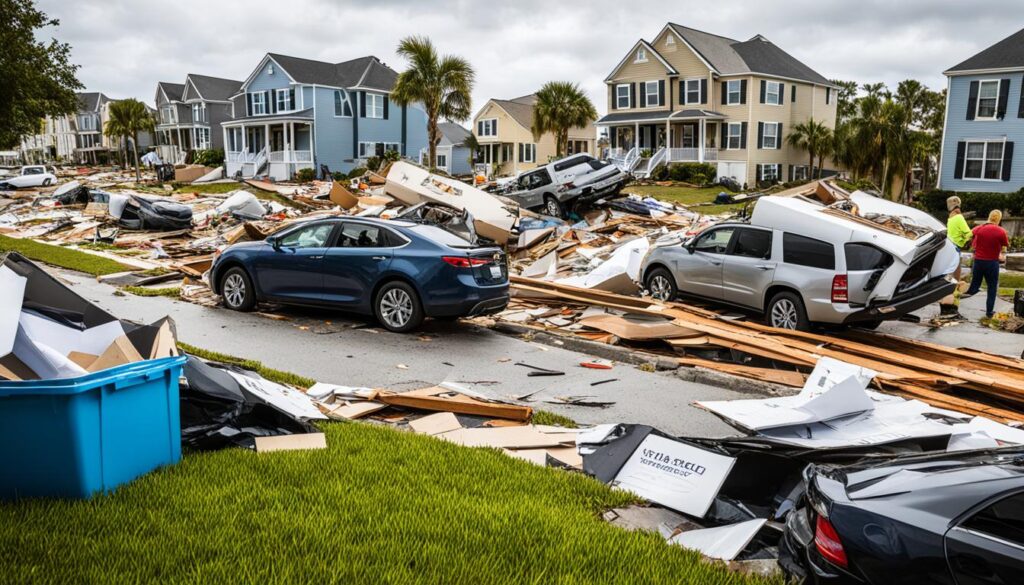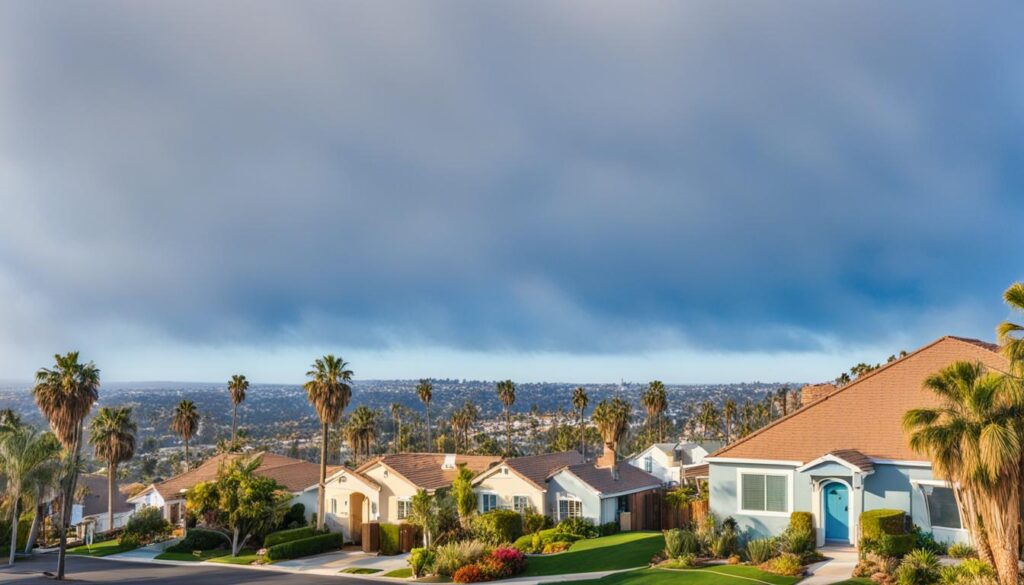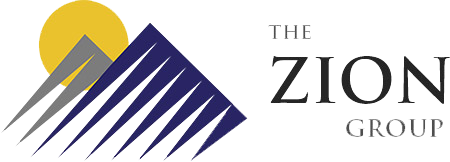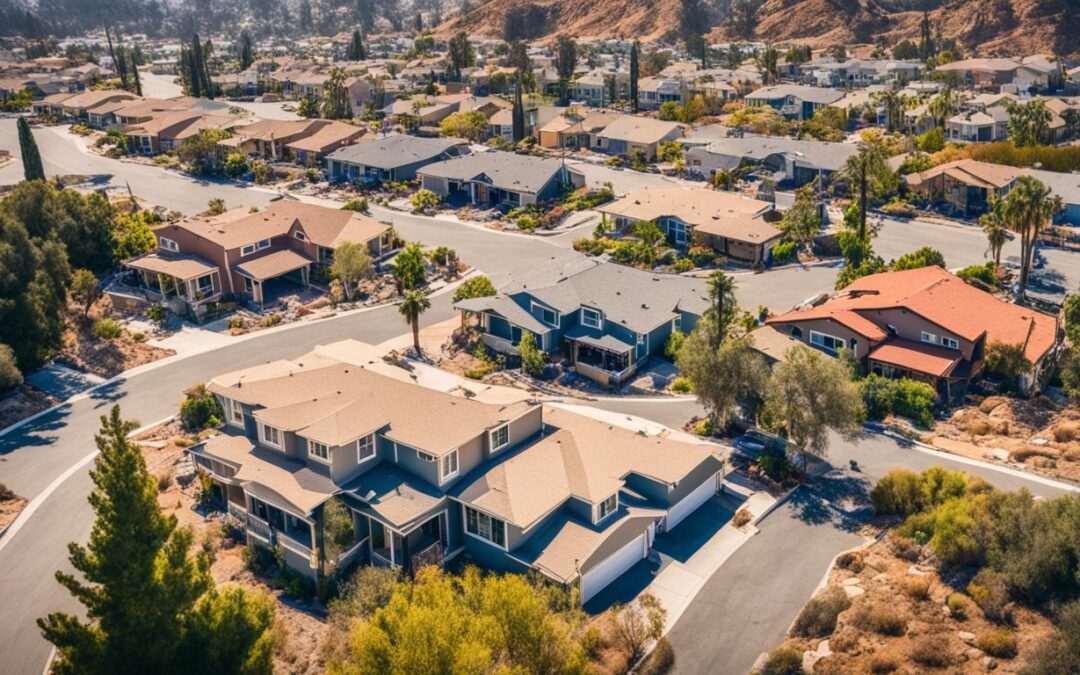Did you know that properties located near wildfire perimeters in California experience lower appreciation compared to those farther away? This connection between natural disasters and property values highlights the significant impact that these events can have on the San Diego real estate market. San Diego County, known for its vulnerability to wildfires, is particularly affected by this trend. Properties with higher wildfire risk scores in San Diego sell for less and appreciate at a slower rate than properties with lower wildfire risks.
Key Takeaways:
- Natural disasters, such as wildfires, can have a negative impact on property values in San Diego.
- Properties with higher wildfire risk scores sell for less and appreciate at a slower rate.
- San Diego County is one of the most vulnerable areas to wildfires in California.
- Investing in high-risk areas requires careful consideration of the potential impact of natural disasters on property values.
- Homeowners should implement disaster preparedness measures to protect their properties.
Frequency and Financial Implications of Natural Disasters in the U.S.
The United States has witnessed a dramatic rise in both the frequency and financial consequences of natural disasters in recent years. This trend has had a significant impact on various sectors of the economy, including the real estate industry. As the frequency of natural disasters continues to increase, the financial implications on the U.S. economy and the real estate sector are becoming more evident.
On average, there are now approximately 20 natural disasters in the U.S. each year, costing over $1 billion. This represents a substantial increase compared to the averages of 6.7 events in the 2000s and 12.8 events in the 2010s. The rising number of natural disasters poses considerable challenges to homeowners, businesses, and the overall economic stability of the country.
Wildfires
One of the most prevalent types of natural disasters facing the U.S. is wildfires. These wildfires have caused billions of dollars in damages across the country, particularly in states such as California, Oregon, and Washington. The increasing severity and frequency of wildfires have led to the destruction of homes, infrastructure, and vast tracts of land. The financial toll of these wildfires has had a direct impact on the real estate sector, resulting in property damage, decreased property values, lost revenue, and increased insurance costs.
Floods
In addition to wildfires, floods are also a recurring natural disaster in the U.S., affecting various regions. From coastal areas prone to storm surges and hurricanes to inland areas susceptible to heavy rainfall and river flooding, the financial implications of floods are significant. Floods can cause substantial damage to properties, leading to the devaluation of real estate assets and hindering economic recovery in affected areas.
Moreover, insurance costs have been rising due to the increasing risks associated with natural disasters. The heightened frequency and severity of natural disasters have forced insurance companies to adjust their rates, which directly affects homeowners and property investors. The rising cost of insurance is an additional financial burden for property owners, making real estate investments in high-risk areas less attractive.
“The increasing frequency and financial implications of natural disasters in the U.S. underscore the urgent need for disaster preparedness and resilience measures. Real estate investors and homeowners must prioritize safeguarding their properties and ensuring adequate insurance coverage to mitigate the potential financial risks associated with natural disasters.”

These increasing financial implications of natural disasters highlight the critical importance of proactive measures to protect the U.S. economy and the real estate sector. By investing in disaster preparedness, implementing resilient infrastructure, and promoting sustainable practices, the nation can better withstand the economic shocks caused by natural disasters.
| Natural Disaster | Financial Implications |
|---|---|
| Wildfires | Billions of dollars in damages, property devaluation, lost revenue, increased insurance rates |
| Floods | Property damage, decreased property values, hindrance to economic recovery |
| Insurance Costs | Rising insurance rates, additional financial burden for property owners |
Challenges and Strategies for Real Estate Investors
Natural disasters pose unique challenges for real estate investors. The direct property damage caused by these events can lead to substantial financial losses, including lost revenue, repair expenses, and disruptions in cash flow. Furthermore, the cost of insurance has surged in response to the increased frequency and severity of natural disasters, further impacting investors’ bottom line.
To navigate these challenges, real estate investors must adopt a diversified investment strategy that takes into account the potential impact of natural disasters on different regions. Geographic diversification allows investors to spread their risk across multiple locations, reducing their exposure to any one specific area.
By diversifying their investments, real estate investors can mitigate the potential negative effects of natural disasters on their portfolio. Instead of relying solely on properties located in high-risk areas, they can strategically allocate their resources across regions with varying levels of natural disaster risks.
“Diversifying your real estate investments geographically is essential to mitigate the impact of natural disasters on your portfolio. By spreading your investments across different regions, you can minimize the risk of direct property damage caused by these events,” advises Rachel Smith, real estate expert at Smith Property Investments.
Moreover, investors must consider not only traditional economic factors but also the specific natural disaster risks and associated insurance costs when making investment decisions. Conducting thorough due diligence on the natural hazard risks of a particular area is crucial. This includes considering the susceptibility to wildfires, floods, hurricanes, earthquakes, and other natural disasters that can affect property values and insurance premiums.
“As an investor, it’s crucial to evaluate the natural disaster risks associated with potential investments. Understanding the likelihood and severity of natural hazards in an area can help you anticipate future insurance costs and determine the long-term viability of your investment,” advises Jason Thompson, CEO of Thompson Property Group.
By assessing the natural disaster risks and associated insurance costs, real estate investors can make informed decisions and protect their investments. Engaging with insurance professionals who specialize in insuring properties in high-risk areas is also highly recommended.
Benefits of a Diversified Investment Strategy
A diversified investment strategy offers several benefits to real estate investors:
- Reduced exposure to direct property damage from natural disasters
- Minimized disruptions in cash flow
- Protection against the rising cost of insurance
- Enhanced portfolio resilience in the face of regional disasters
- Increased potential for long-term growth and profitability
Natural Disaster Risk Assessment by Region
| Region | Primary Natural Disaster Risks | Associated Insurance Costs |
|---|---|---|
| West Coast (California, Oregon, Washington) | Wildfires, earthquakes | High |
| Gulf Coast (Texas, Louisiana, Florida) | Hurricanes, flooding | High |
| Tornado Alley (Midwest) | Tornadoes, hailstorms | Moderate |
| East Coast (Florida, Carolinas, New York) | Hurricanes, coastal flooding | High |
| Rocky Mountain Region | Wildfires, blizzards | Moderate |
By incorporating geographic diversification and considering the natural disaster risks and associated insurance costs, real estate investors can develop a resilient and profitable investment portfolio. While natural disasters pose challenges, strategic planning and informed decision-making can help investors overcome these obstacles and thrive in the ever-changing real estate market.

Conclusion
The impact of natural disasters on San Diego real estate is significant. Properties located in high-risk areas or with higher wildfire risk scores experience lower appreciation and sell for less compared to properties in lower-risk areas. It is crucial for real estate investors to consider natural disaster risks and associated insurance costs when making investment decisions.
Additionally, homeowners should prioritize disaster preparedness measures to protect their properties and minimize potential damages. This includes implementing strategies such as maintaining defensible space, having proper insurance coverage, and creating emergency plans. Being prepared can mitigate the financial and emotional toll that natural disasters can have on homeowners.
The Zion Group, a leading real estate company, understands the complexities of the San Diego real estate market and the implications of natural disasters. Their team of experts can provide invaluable advice and guidance to both investors and homeowners, helping them navigate the challenges and make informed decisions in the face of these risks. To learn more about how The Zion Group can assist you, visit their website at https://theziongrp.com/.
FAQ
How do natural disasters affect property values in San Diego?
Properties located in high-risk areas or with higher wildfire risk scores experience lower appreciation and sell for less compared to properties in lower-risk areas.
What is the impact of natural disasters on the San Diego real estate market?
Properties with higher wildfire risk scores in San Diego sell for less and appreciate at a slower rate than properties with lower wildfire risks.
What should real estate investors consider when it comes to natural disasters?
Real estate investors need to consider natural disaster risks and associated insurance costs when making investment decisions. Geographic diversification and a diversified investment strategy can help mitigate these risks.
How can homeowners protect their properties from natural disasters?
Homeowners should implement disaster preparedness measures, such as securing their property, maintaining defensible space, and having insurance coverage that adequately protects against natural disasters.
The Zion Group, a real estate company, can provide expert advice and guidance on the impact of natural disasters on the San Diego real estate market. Visit their website at https://theziongrp.com/ for more information.


Recent Comments